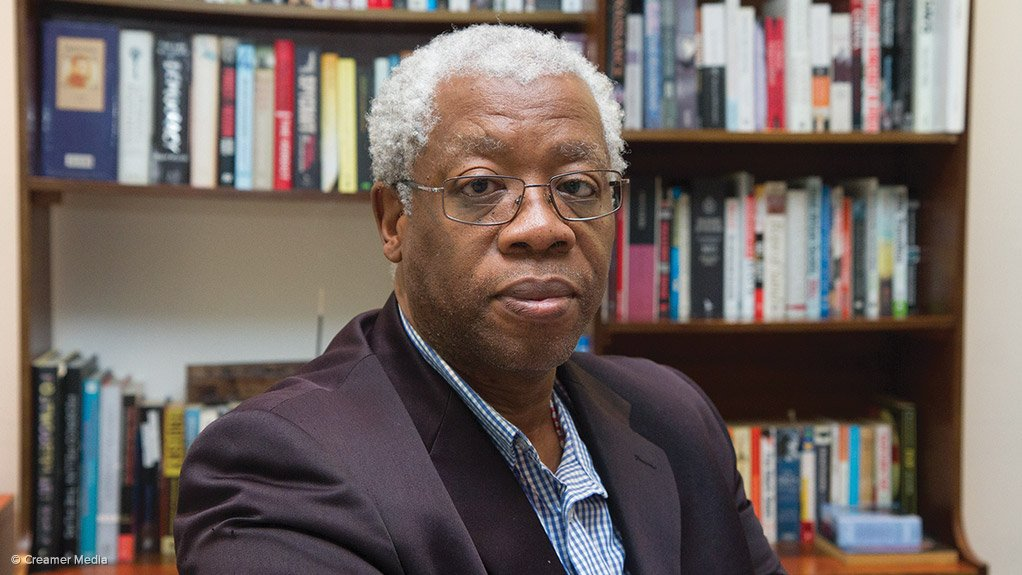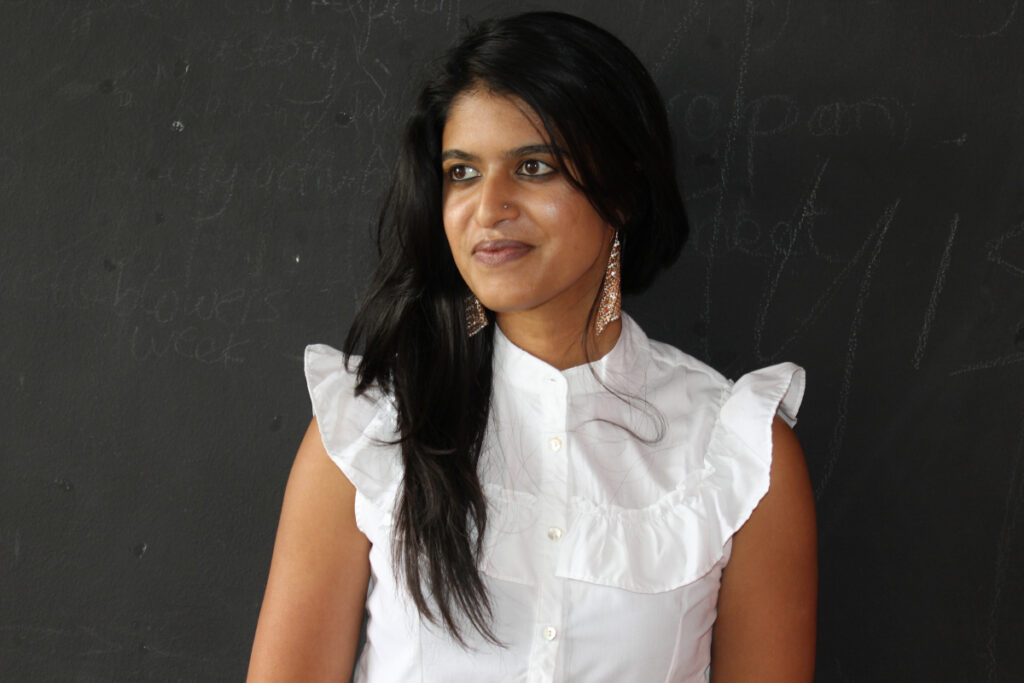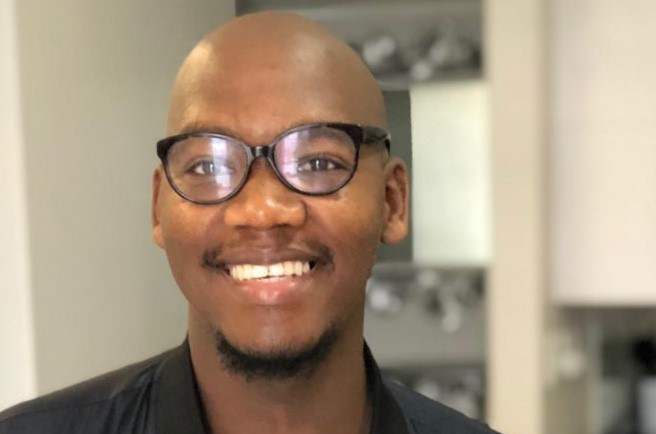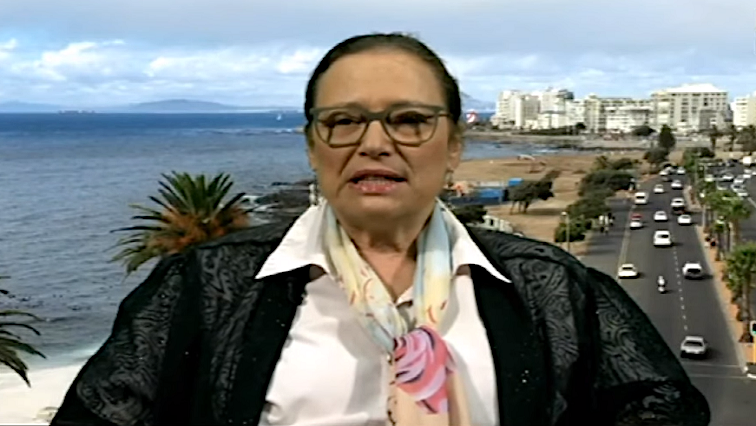Part 1
This three-part Mail & Guardian webinar series was sponsored by the Democracy Development Program (DDP). The first webinar featured Aubrey Matshiqi, Independent Political Analyst; Kavisha Pillay, Head of Stakeholder Relations and Campaigns at Corruption Watch; and Sphamandla Brian Mhlongo, Senior Programmes Officer at the DDP. It was moderated by Dr Dirk Brand, Extraordinary Senior Lecturer at the School of Public Leadership, Stellenbosch University.
Corruption at local government level is a direct attack on South African communities and it violates their constitutional rights to decent services. The speakers in this three-part webinar series unpacked a variety of issues that may help to address endemic corruption and lack of service delivery, such as really listening to what communities need, really enforcing anti-corruption legislation, protecting whistle-blowers at local level, and learning from the lessons of Covid-19 and lockdown.
 Dr Dirk Brand, Extraordinary Senior Lecturer at the School of Public Leadership, Stellenbosch University
Dr Dirk Brand, Extraordinary Senior Lecturer at the School of Public Leadership, Stellenbosch UniversityWe are all affected by the failures of local government (LG), and it is clear what its role is, so why are so many LGs failing in their tasks, as evidenced by the auditor-general’s reports, asked Dr Dirk Brand? He then introduced Aubrey Matshiqi and Kavisha Pillay.
Matshiqi said that in 1984 some councillors were killed by members of the community in the Vaal Triangle, and six of their killers were sentenced to death. MK launched an attack on the Urban Bantu Council in Soweto some years later. This was because there was a lot of resistance to LG under apartheid rule, and the people involved in it were seen as sell-outs. There were many inequalities in LGs regarding white and black communities, and some communities did not have LGs at all. Today’s LGs are supposed to deliver the antithesis of apartheid LGs.
LGs are supposed to promote non-racial development, in a decentralised manner. According to their policy framework, they should deliver, but the reality does not match up; LGs are failing to live up to the promises of development outlined in the constitution. Perhaps we were idealistic, and did not take into account the local conditions and the economy of many areas, which lack an economic base, or it is too narrow. Perhaps there is a need to recalibrate the state of local and provincial developmental programmes, so there is no mismatch between what is expected and what is possible. Is there a sufficiently strong economic base? When citizens vote next year, they must raise this issue.
 Aubrey Matshiqi, Independent Political Analyst
Aubrey Matshiqi, Independent Political AnalystThe corruption that is happening at local government level is the same occurring at higher levels and in state-owned enterprises, said Pillay. LGs were regarded as the second-most corrupt institutions after the police in a recent survey, the Global Corruption Barometer. Corruption in LGs is a direct attack on the people; it prevents development from happening and from systemic inequality being addressed. There have been over 31 000 complaints received by Corruption Watch, about half at local level. Whistle-blowers have indicated there is embezzlement at local municipal level, bribery of officials regarding issuing licences, “sextortion” of women who want to receive RDP houses, etcetera.
Corruption directly affects communities, for instance when Eskom cuts off people who have paid electricity, but it was actually the local council that stole their money. There were many reports of food parcels being stolen or distributed on a system of patronage during lockdown. Corruption usually occurs at local level because there is no accountability; officials act with a sense of impunity.
People must participate in democracy beyond just casting a vote; they must keep councillors accountable. Information must be open to comment and feedback. Municipalities must have an open-door policy and create environments that enable whistle-blowing. Citizens should be vigilant and aware and initiatives should be put in place for them to help to overcome corruption, such as citizen report cards.
Questions
Is there sufficient anti-corruption legislation? Pillay said that there is, but there is not enough will or capacity to enforce it. The Local Government Anti-Corruption Forum was recently formed to help in this regard. Citizens must become more involved, so Corruption Watch is scaling up making the information they need available. Matshiqi said there are many policies but little implementation; and the state must bridge the gap between words and action.
 Kavisha Pillay, Head of Stakeholder Relations and Campaigns at Corruption Watch
Kavisha Pillay, Head of Stakeholder Relations and Campaigns at Corruption WatchIs the Integrated Development Plan (IDP) a sufficient tool to involve citizens? The Promotion of Access to Information Act has become dated, said Pillay. This Act must be fixed for proper monitoring to occur. We shouldn’t have to beg for information; some countries have put municipal info online for citizens to examine. Appointment of officials should involve citizens more and the process should be transparent, so cadres are not appointed, and the best people are. People with integrity must be appointed to municipal offices to prevent corruption there.
The constitution talks about meaningful participation by citizens; at present they have very little input. Citizens must become policy initiators at IDP level, so that policies match the needs of communities, said Matshiqi. Brand said the Covid-19 crisis has also shown how citizens must become involved in creating solutions to our problems.
Those doing monitoring and evaluation rely mainly on reports sent to them. The state must be able to monitor and intervene almost in real time, using modern technology. The model must be recalibrated — there is a mismatch between what is expected of municipalities and what they are able to deliver — they must be more aligned with their available resources.
Corruption has become endemic and systemic; our biggest problem in South Africa is inequality, which makes it difficult to prevent or reduce corruption. Poor people are far more likely to engage in corruption because they have no other choice; it is one way for the vulnerable to access services. We need to have more nuanced discussions about corruption.
Matshiqi said we must ensure that citizens can take part, and civil society has a big role to play here. Pillay agreed, and said tools must be developed to hold local official accountable. There must be more investigations at LG level and ensure that there are consequences. The culture of impunity must end.
Sphamandla Brian Mhlongo said that citizens must be empowered to hold LG officials to account. Social auditing tools are useful in this regard. This comment came from audience member Mdu Mkhonza: “Until such time that we implement community-based planning and monitoring, the status quo will remain.”
To view the webinar, click on the link below
Part 2
The second webinar featured Qhamani Tshazi, Programme Officer for Sustainable Human Settlements at Afesis-Corplan and Nobuhle Kunene, Independent Researcher. It was moderated by Bonolo Makgale, Manager of the Democracy and Civic Engagement Unit at the Centre for Human Rights, University of Pretoria (UP). It was introduced by Sphamandla Brian Mhlongo, Senior Programmes Officer at the DDP.
Bonolo Makgale said that public participation is important for the democratic process, particularly to ensure that the government has legitimacy and to assess what the views of the minorities are. Why is it that after 26 years our democracy is not as inclusive as it should be? The class question also needs to be raised.
 Qhamani Tshazi, Programme Officer for Sustainable Human Settlements at Afesis-Corplan
Qhamani Tshazi, Programme Officer for Sustainable Human Settlements at Afesis-CorplanQhamani Tshazi focused on the impact of Covid-19. Public participation is one of the cornerstones for any democracy, and is especially important for the have-nots, who have been left out of the decision-making process for centuries, and who need to claim their power. The people have expressed their grievances through service delivery protests and #FeesMustFall. There are various acts that regulate public participation at local government (LG) level, such as the Municipal Systems Act 32 of 2000 and the Batho Pele principles governing how citizens should be treated by LG representatives.
There has been much talk lately about the failure of public participation, due to its tokenist nature. There is a prevalence of white elephants, such as stadiums that are not being used, or schools that were built when a community wanted something else. The public is often invited to public events but is not accorded co-creator status.
During the lockdown this process crashed even further, as public meetings were banned. However, municipalities became more innovative in their public participation techniques and service delivery: for instance, overnight food parcels were being distributed, and water tankers arrived where people had been begging for water for a long time. This was due to the centrality of decision making, which was handled by offices higher up in the chain. Some municipalities introduced apps that allowed citizens to comment on certain processes such as the IDP in their areas. But real public participation entails citizens sitting down and drafting proposals that councils act upon.
 Nobuhle Kunene, Independent Researcher
Nobuhle Kunene, Independent ResearcherA monitoring tool to assess the effectiveness of public participation was introduced. Lockdown accelerated service delivery during lockdown due to centralised service delivery decision-making, without public participation. There was faster response to the needs of communities, so what lessons can be learned from this? Some people believe apps may be the answer, but they mean nothing to people in informal settlements who don’t have access to power and the internet. Municipalities cannot just tick the boxes and say they invited public participation in meetings but proceeded with their own decisions anyway. The process must be transparent, and if the community is not happy with how a municipality has engaged with their decision, another meeting must take place.
Equity is vital: the opinions of those who have been the most excluded should perhaps count the most. Many people are selling their RDP houses because they cannot afford to maintain them; it may have been more constructive to consult such people and ask what they really needed. If the public is not consulted, they will rebel against decisions made without them. The public should also have an opinion on how consultation programmes are operated, so they can contribute constructively.
Nobuhle Kunene noted that local elections were postponed because of Covid-19, but said this decision was an error or glitch. When a crisis like this occurs, the Electoral Commission approaches the Electoral Court for permission to postpone, but this must take place within 90 days, and sometimes this timeframe is insufficient. The relationship between citizens and government in a democracy is often described as a social contract, but South Africa’s unique conditions mean this contract is often not adhered to, and is better expressed in terms of ubuntu; instead of individual rights, the rights of the community take priority. So the decision to postpone the election should have been taken as a collective: the public should have been consulted. Other ways of dealing with emergencies must be found.
Besides this, having to approach the court every time there is an emergency is an inefficient way to proceed for the Electoral Commission; it cannot evolve and adapt to circumstances, and this puts the entire democratic process at risk. Kunene proposed instead that there is electoral emergency legislation to manage unexpected disruptions to the election process, which involves consulting the public, as it is their rights that may be impacted upon. Moving forward, decisions cannot be made behind closed doors; it is an inefficient way to deal with democratic challenges, and we won’t be able to learn from emergencies like this.
A question was asked concerning how the voice of citizens can be heard? Tshazi said citizens cannot be said to have claimed power in South Africa; for instance, they respond to the lack of housing by establishing informal settlements. Citizens can only make decisions during elections, about who will rule them, and after that they have no power. Decisions must be made in collaboration, where theory becomes practice, where power is shared between the people and the government, and involves other groups such as civil society organisations. There must be collaboration in making decisions and in monitoring the progress made on those decisions.
Mhlongo asked, what’s the point of public participation if citizens don’t have the capacity to recall councillors for non-performance? The capacity of citizens to understand the power they hold must be improved, and realising what mechanisms are available to them, replied Tshazi.
 Bonolo Makgale, Manager of the Democracy and Civic Engagement Unit at the Centre for Human Rights, University of Pretoria
Bonolo Makgale, Manager of the Democracy and Civic Engagement Unit at the Centre for Human Rights, University of Pretoria For an effective democracy, bodies such as the Electoral Commission (and local governments) must stick to their mandates; in their case, it is to ensure that regular elections are held, said Kunene. Liberia, for instance, held an election during an Ebola crisis, and voter turnout actually increased. To make such decisions, we all need to be consulted and involved. The role of the court should be to review certain actions in terms of the law and legislation. If citizens are not consulted on decisions such as wearing masks during Covid-19 then they feel isolated, and often disobey them.
Placing voting on a digital platform is risky; many are struggling with digital learning as they are unfamiliar with online processes or don’t have access to WiFi. Perhaps in the future, said Kunene.
Audience member Sonwabile Dwaba said: “I don’t think we have addressed the disjuncture between local and provincial and national governments. Local governments are the breeding ground for corruption and this has resulted in apathy.” Tshizi replied that the three different spheres of government are supposed to work together, but they often act on their own. There is very little oversight, especially at local level, and citizens are not empowered to rectify the issue if their councillor is out of her depth.
Makgale concluded by saying that this discussion has opened up a space for people to address the differences between the dreams of our forefathers and the reality in our country today.
To view the webinar, click on the link below:
Part 3
The third webinar featured Dr Isaac Khambule, Lecturer at the School of Built Environment and Development Studies, University of KwaZulu-Natal; Janet Love, vice-chairperson of the Independent Electoral Commission of South Africa (IEC); and it was monitored by Sphamandla Brian Mhlongo, Senior Programmes Officer at the DDP.
Janet Love said that the electoral events are complex and huge in each province. The voters’ roll reflects issues of commitment and enthusiasm in our country. About 55% are women and 44% are men, with slight variations for the provinces. In terms of ages, the 18-19 and 20-29 groups are very low in participation; there should be much greater participation. There was significant growth in voters from 1994, but it is dropping off in 2019-2020.
 Dr Isaac Khambule, Lecturer at the School of Built Environment and Development Studies, University of KwaZulu-Natal
Dr Isaac Khambule, Lecturer at the School of Built Environment and Development Studies, University of KwaZulu-NatalCovid-19 has impacted on the voting process, and will make voting very difficult. There is hope for a vaccine, but not a guarantee, and now there is an increase of infections again. There are difficulties with observation and mobilising. The IEC has been working on e-learning platforms in response to Covid-19.
There has been serious shortcomings at LG level and rampant corruption, and there is not enough protection for whistle-blowers. The role of civil society includes ensuring access to information, and training citizens in the roles that they can play.
Love said there has been strong co-operation from many organisations regarding commitment to Covid-19 protocols and observations of by-elections. There has been much economic deprivation. The IEC has had to cut its budget significantly, and there have been more costs, such as PPE.
How can civil society organisations work with LG, Mhlongo asked Dr Isaac Khambule. There is a white paper that addresses co-production. China was able to raise millions from poverty by LG working with civil society, but in South Africa there is a lot of mistrust between private companies, government and civil society.
Co-production cannot happen if citizens don’t trust councillors, and if councillors don’t take their ideas seriously; LG officials must take citizens’ idea seriously. IDPs are collated at a local level, but they don’t synch with local needs. Engagement with communities is vital to improve outcomes — for instance, street lights were provided in Cape Town, but they did not suit the needs of the community where they were erected.
This comment came in from audience member Luyanda Shilangu: “Spot on Dr, on the importance of a functional relationship between communities and the municipality. Of utmost importance is for both parties to establish trade-offs from the relationship.”
 IEC Speaker Janet Love
IEC Speaker Janet LoveWhat processes can be instituted to make voting easier in the light of Covid-19, such as mail-in voting that was used in the US? Love said that it is crucial for young voters to register; the IEC offices are open in most locations. If more people partake in the process, it creates a constituency. The more new voters come in for registration, the more people vote, which strengthens the democratic process. Young people have many ideas, and they must be taken into account. If a municipality is promising to build something like a dam, the youth must be able to challenge that. There are many technologies that can be utilised. Voters must vote in the appropriate place; we are working on an upgraded voter registration device to prevent fraudulent voting from occurring.
Khambule said regarding independent candidates in local elections, if they can run successfully at national level, then the LG sphere will be infiltrated by such people.
Love said in closing that civil society needs to solidify connections to make a district or province work. After an election, the duty is to perform, to override partisan approaches. South Africa has robust civil society organisations such as the DDP, which will help to ensure that the people who are elected actually do their jobs.
To view the webinar, click on the link below: